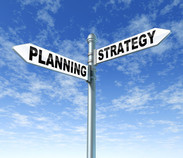Strategic Business Planning: Plan to Succeed
The 21st century business landscape is more challenging than ever before. Consequently, management can become so involved and bogged down in daily routine activities that they often lose sight of their company’s purpose. Business owners and managers, who may at one time have had a clear vision for their company, find themselves overwhelmed by organisational problems, losing perspective of business goals, objectives and future opportunities.
Strategic business planning is a process that provides direction and meaning to day-to-day business operations. Its purpose is to help you to create an effective strategic plan, allowing your business to capitalise on its strengths, neutralise its weaknesses, take advantage of opportunities and prepare for potential threats.
Strategic Business Planning: What Is It?
Strategic business planning is a management tool. Like any other management tool, its primary purpose is to help improve performance, and, ultimately, achieve success. Strategic business planning will help focus energies, ensure that all “team” members are working toward the same goals, and help making the necessary changes in response to an ever-changing marketplace.
Long-term business planning (sometimes referred to "business as usual planning") is based on the assumption of stability, continuing to do what has been done in the past and assuming that everything else stays the same. Strategic business planning looks to the future and how the external environment is changing and what the organisation intends to do to adapt what it does and how it does it to stay in tune with the changing environment and secure its future. Strategic business planning is planning for change. It provides the basis not only for planning improvements in performance, but also for the adjusting the daily activities of the management and evaluation of progress against the plan.
It is a systematic management tool for problem solving, market planning, product or service development. The goal is to integrate all aspects of a business’s activities in a mutually supportive system that promotes team working and efficiency and effectiveness. The plan is a set of decisions about what to do, why to do it and how to do it.
Successful strategic planning:
- Creates a shared vision;
- Guides choices and leads to action;
- Is an all-inclusive process between management and stakeholders;
- Starts with focus on the external environment; and
- Is a key part of the effective management of the business.
Strategic Business Planning: Why Do It?
Planning and goal-setting have continually proven to be positive influences on overall business performance. Since strategic business planning is all about goal-setting, its impact, when executed correctly, can unequivocally help a business operate better. It is an essential part of marketing and communication of the aims of the business both internally and externally. You need to be able to communicate your plan and collaborate on it with others.
Today’s businesses must cope with a roller-coaster economy, constant changes in customer preferences and demographics, rapid advancements in technology and evolving workplace requirements. These movements can have both a positive and negative impact on a business, affecting each business differently. The best approach for dealing with these challenges is through strategic business planning. Putting these challenges into perspective through a well thought-out strategic plan allows a business to address problems in a co-ordinated way. By bringing together the various elements of a problem, a total solution can be developed allowing an organisation to adapt to the environment and gain control of its future.
The written strategic business plan is the place where vision and reality meet. The act of thinking about everything that must go into the plan will force you to think through the all the logistics of your business and often helps to crystallise passing thoughts and ideas.
The plan will help organise all the different pieces that have to come together in order for your business to be a success. The structure that a written plan provides makes it more likely that you will consider all relevant factors and that nothing of importance slips through the cracks and will give you confidence that you haven't missed any significant issues that could cause your business to nose-dive.
Having a written plan is an essential communication tool. It’s just not practical to explain your operations and vision in person each time someone needs to know who you are and what your company is all about. Management, employees, professional advisors, and investors all need to know what the future plans are for the business. They need to see where they fit in, how they can help and be able to share suggestions based on their expertise that will help the company succeed.
The process can be complex, challenging and even messy. There will be defensiveness and sensitivity particularly from those who feel threatened.
Strategic leadership means continually asking the questions: are we taking the appropriate action, and are we doing the right thing? Strategic leadership is focused on the future, which is always subject to change, yet, to a certain extent, still predictable in the context of the future environment. Being a successful business leader requires constant “out-of-the-box” thinking that takes into consideration the big picture. It means having the willingness to embrace and adapt to changing circumstances.
Strategic business planning helps to energise and motivate people, providing leadership, forward direction and guidance


